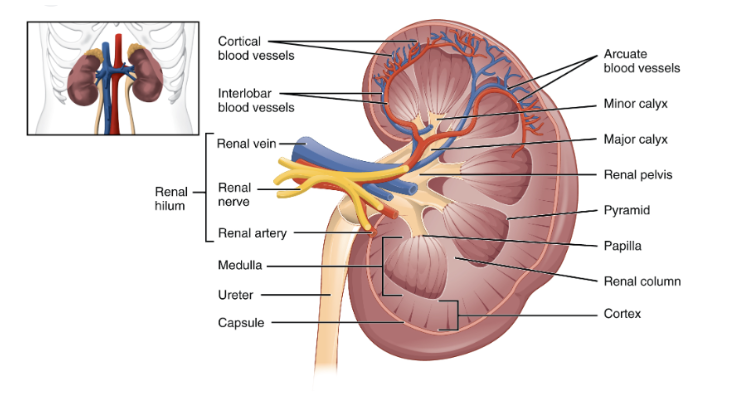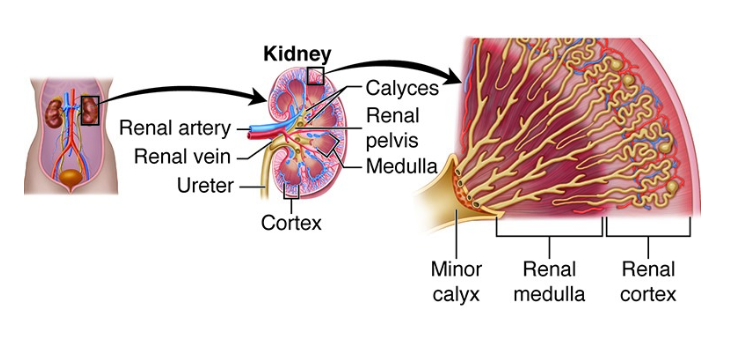Table of Contents
Introduction
The kidney is an essential organ in the human body that performs several critical functions. The kidney is a paired organ located in the abdominal cavity, one on each side of the spine. They are bean-shaped and about the size of a fist. The kidneys are part of the urinary system, along with the ureters, bladder, and urethra.

Structure of kidney
The kidney has both external and internal features that contribute to its structure and function. Here’s an overview of the external and internal features of the kidney:
External Features
- Renal Capsule: The kidney is surrounded by a tough, fibrous layer called the renal capsule, which provides protection to the kidney.
- Renal Hilum: The renal hilum is a concave area on the medial side of the kidney where the renal artery, renal vein, and ureter enter and exit the kidney.
- Renal Cortex: The outer region of the kidney is called the renal cortex. It contains millions of tiny filtering units called nephrons.
- Renal Medulla: The inner region of the kidney is called the renal medulla. It consists of renal pyramids, which are cone-shaped structures that contain tubules responsible for transporting urine.
Renal Pelvis: The renal pelvis is a funnel-shaped structure located at the center of the kidney. It collects urine from the renal tubules and transports it to the ureter.
Internal Features
- Nephrons: The nephrons are the functional units of the kidney. Each kidney contains millions of nephrons, which consist of a renal corpuscle and a renal tubule. The renal corpuscle filters blood, while the renal tubule processes the filtered fluid to form urine.
- Renal Artery and Vein: The renal artery brings oxygenated blood to the kidney, while the renal vein carries deoxygenated blood away from the kidney.
- Renal Pelvis and Calyces: The renal pelvis receives urine from the renal tubules, and it is then transported to the ureter. The calyces are cup-shaped structures that collect urine from the renal pyramids and funnel it into the renal pelvis.
- Renal Tubules: The renal tubules are responsible for reabsorbing important substances from the filtered fluid and secreting waste products into the urine.
- Collecting Ducts: The collecting ducts receive urine from multiple nephrons and transport it to the renal pelvis.

These external and internal features work together to facilitate the filtration, reabsorption, and secretion processes involved in urine formation, as well as the transportation of urine to the urinary bladder for elimination from the body.
Function of kidney
The kidneys play a vital role in maintaining the overall health and homeostasis of the body. Here are some key functions of the kidneys:
- Filtration of Blood: The kidneys filter waste products, toxins, and excess substances from the bloodstream, including metabolic waste products like urea, uric acid, and creatinine. This filtration process occurs in the microscopic units called nephrons.
- Regulation of Fluid and Electrolyte Balance: The kidneys regulate the balance of water and electrolytes (such as sodium, potassium, calcium, and phosphate) in the body. They selectively reabsorb necessary substances and adjust the excretion of excess substances to maintain proper balance.
- Acid-Base Balance: The kidneys help regulate the pH balance of the body by excreting hydrogen ions and reabsorbing bicarbonate ions. This helps maintain the blood’s pH within a narrow range, which is crucial for normal cellular function.
- Blood Pressure Regulation: The kidneys produce a hormone called renin, which plays a role in regulating blood pressure. Renin helps control the constriction and dilation of blood vessels, as well as the balance of fluid and electrolytes in the body.
- Red Blood Cell Production: The kidneys produce a hormone called erythropoietin, which stimulates the bone marrow to produce red blood cells. This hormone helps maintain adequate oxygen-carrying capacity in the blood.
- Waste Excretion: The kidneys eliminate waste products, excess substances, and foreign chemicals from the body through the production and excretion of urine.
- Detoxification: The kidneys help detoxify substances by filtering and eliminating harmful compounds, drugs, and toxins from the bloodstream.
- Vitamin D Activation: The kidneys activate vitamin D, which is essential for calcium absorption and bone health.
The main function of the kidneys is to filter waste products, excess water, and toxins from the blood to produce urine. They help maintain the balance of fluids, electrolytes, and acid-base levels in the body. The kidneys also play a role in regulating blood pressure and producing hormones involved in red blood cell production and calcium metabolism.
Kidney-Related Diseases
The kidneys are susceptible to various diseases and conditions that can impair their function. Here are some common kidney-related diseases:
Chronic Kidney Disease (CKD): CKD is a progressive condition in which the kidneys gradually lose their function over time. It can be caused by various factors such as diabetes, high blood pressure, recurrent kidney infections, and certain genetic disorders.
Kidney Stones: Kidney stones are hard deposits of minerals and salts that form in the kidneys. They can cause severe pain when they pass through the urinary tract and may require medical intervention for removal.
Urinary Tract Infections (UTIs): UTIs can affect the kidneys, bladder, ureters, or urethra. When bacteria enter the urinary tract, it can cause infection and inflammation. If left untreated, UTIs can lead to kidney infection and damage.
Polycystic Kidney Disease (PKD): PKD is an inherited condition characterized by the growth of numerous fluid-filled cysts in the kidneys. These cysts can gradually enlarge and impair kidney function over time.
Glomerulonephritis: Glomerulonephritis is a condition where the tiny filters in the kidneys, called glomeruli, become inflamed. It can be caused by infections, autoimmune disorders, or certain medications. Glomerulonephritis can lead to kidney damage and impaired filtration.
Kidney Cancer: Kidney cancer refers to the abnormal growth of cells in the kidneys. Common types of kidney cancer include renal cell carcinoma and transitional cell carcinoma. Treatment options vary depending on the stage and type of cancer.
Acute Kidney Injury (AKI): AKI is a sudden and severe loss of kidney function, usually resulting from a sudden decrease in blood flow to the kidneys or direct damage to the kidneys. It can be caused by conditions such as dehydration, severe infections, kidney trauma, or certain medications.
Nephrotic Syndrome: Nephrotic syndrome is a group of symptoms that occur due to damage to the small blood vessels in the kidneys. It is characterized by the presence of excess protein in the urine, low levels of protein in the blood, swelling (edema), and high cholesterol levels.
These are just a few examples of kidney-related diseases. It’s important to note that early detection, proper medical care, and lifestyle modifications can help manage or slow the progression of these conditions and promote kidney health.
Kidney diseases and conditions can affect the structure and function of the kidneys, leading to various health problems. Common kidney disorders include kidney stones, urinary tract infections, polycystic kidney disease, and chronic kidney disease. These conditions may cause symptoms such as pain, changes in urination patterns, swelling, fatigue, and abnormal blood and urine test results.
Conclusion
The kidney has a complex internal structure consisting of millions of microscopic functional units called nephrons. Each nephron consists of a renal corpuscle, which filters the blood, and a tubule, which processes the filtered fluid to produce urine. The urine formed in the kidneys is then transported through the ureters to the bladder for storage until it is eliminated from the body through the urethra during urination.
Maintaining a healthy lifestyle, including a balanced diet, regular exercise, and proper hydration, is important for promoting kidney health. It is also crucial to manage underlying conditions like diabetes and high blood pressure, which can contribute to kidney problems. Regular check-ups with a healthcare professional can help monitor kidney function and detect any potential issues early.






